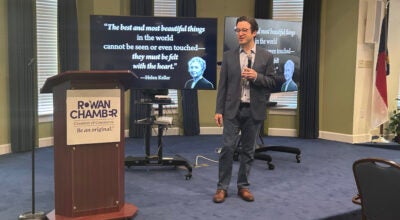City’s women, minority business loan program ‘full steam ahead’ with operational adjustments
Published 12:01 am Thursday, March 3, 2022
SALISBURY — After a monthlong pause, the city’s partnership with the Kiva micro-loan program for women and minority business owners is now full steam ahead with adjustments about how the model will operate in Salisbury.
The Salisbury City Council put the zero-fee, zero-interest micro-loan program on pause to iron out communication and organizational challenges. Kiva is a first step for women and minority entrepreneurs who don’t qualify for loans via the traditional route to build capital and eventually attain larger loans from financial institutions. Loans range from $1,000 to $15,000.
Alissa Redmond, owner of South Main Book Company, was among the first business owners in Salisbury to use the Kiva platform to seek funding for a down payment to purchase her storefront. Redmond said part of the reason she decided to seek a loan through Kiva was to better understand the process in hopes of helping fellow business owners navigate it. Challenges she faced centered around a lack of communication about the process and how matching funds from the city work.
Council member David Post worked alongside Pete Teague of Livingstone College for more than a year to bring the international program to Salisbury. The city of Salisbury committed to Kiva last year and paid a $20,000 annual fee, which was $5,000 less than the normal amount charged due to Salisbury being among the smallest participating cities. Additionally, the city formally set aside $60,000 in the 2021-22 budget from CARES Act funding to support three years of matching funds for borrowers.
In the previous model, Self-Help Credit Union was the designated hub, tasked with housing the point-of-contact for marketing and promoting Kiva and the borrowers who go public. Salisbury served as the funder, with Post and Teague serving as the only formally declared trustees. Trustees are tasked with mentoring, assisting and endorsing the borrower.
Now, the model will be trustee-based. Post and Teague are working to establish Salisbury Kiva, a to-be-formed nonprofit where community members will serve as trustees and be guided with a board of 10-12 members. Trustees will be tasked with promoting Kiva in the community, referring borrowers to the part-time “Kiva Koach,” assisting them with their applications and publicly endorsing and advocating for their crowdfunding campaign.
With Kiva, borrowers must undergo a private fundraising phase where they solicit funds from their own network before they’re publicized on the Kiva platform. Then, donations can be made by the public and the more than 1 million lenders across the nation who are on the platform.
Post said five Salisbury residents have made it on the Kiva platform, with three not obtaining the full amount of funding they needed in time. If borrowers can’t obtain the full amount of the loan, all money given by lenders and managed funds are returned, and the borrower doesn’t receive the loan. Post clarified that borrowers lose no money in the process.
But he showed two examples of Salisbury residents whose loans were fulfilled. One needed $15,000 and received funds from 232 lenders across the nation as well as the United Kingdom, Ghana and the Netherlands. Another needed $6,000 and received funding from 234 lenders across the nation and internationally. Additionally, both received funding from various “trustee teams,” such as PayPal, Women Empowering Women and Africa Common Interest. Both also received matching funds from Bank of America and Sue Hostetler of the Wrigley Family Foundation.
Post said those two examples show the power in the international reach Kiva has.
Post requested the city cover up to $5,000 to pay a part-time “Kiva Koach” position, with that person responsible for spending up to 15 hours a month assisting borrowers with the loan process. Eventually, Post said it would be ideal to reach “certified trustee” status, which comes after building a track record of endorsing borrowers with a 90%-plus repayment rate. The certified status can grant borrowers expedited review and increased funding by $1,000. Additionally, the certified trustee’s endorsement could serve as proof of a legitimate and feasible business plan, waiving a few steps in the process.
Post said the new model is beneficial in several ways: it’s driven by the private sector, no annual funding is needed to cover the Kiva fee and the $20,000 that would’ve covered another year in the previous model can instead be put toward the city’s share of matching funds. Additionally, the city can choose to designate its matching funds only to borrowers in Salisbury.
“The whole purpose is to get the community involved in this,” Post said. “This is going to work better.”
Council member Harry McLaughlin, who considered Kiva as an option for his own business, said the biggest obstacle was a lack of communication and understanding of what the program entailed. Post told McLaughlin he was invited to be a trustee.
“But I think it’s important that we stepped back and we’ve made it … better,” Mayor Karen Alexander said. “So we’re full steam ahead for the next year and then we’ll take a review.”
Mayor Pro Tem Tamara Sheffield said the new program model makes more sense.
“It wasn’t quite what we planned on, but now that we’ve realized what wasn’t working, I think that you have done a great job on coming back with something that makes so much more sense to me,” Sheffield said. “When we do review our budget for 2022-23, I hope that everybody on council wants to continue to invest that money to go toward this. And I think it would be in our best interest to also recommend in our budget planning process that we cover that (part-time position) in there to make sure that it’s done right.”
Council member Anthony Smith commended the reinforced “commitment to diversity, equity and inclusion, especially in the realm of economic development.”
“We want that development to be as diverse as possible,” Smith said.





